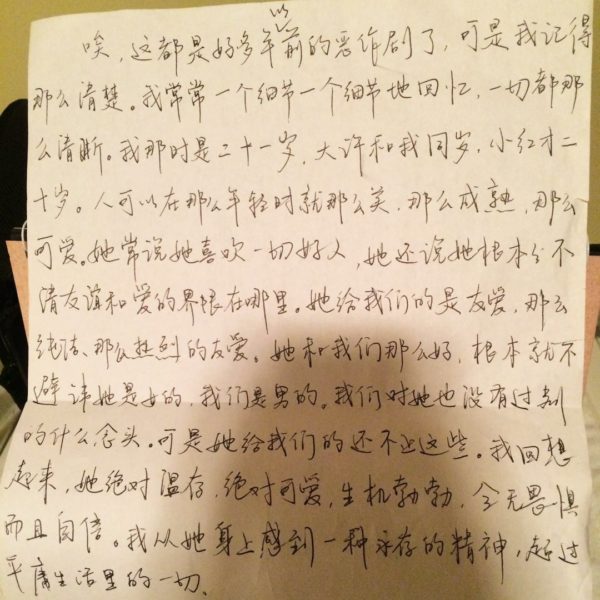去年上半年的阅读作业,关于很喜欢的一本非虚构故事。没有改语病,一下子瞧不出来,细究起来要调整的又太多,就这样吧……
1/2
A lot of animal stories share something in common – writers make great efforts to personify the animals in an artistic way, attaching human values and emotions to the characters. It would no doubt add to the enjoyment of reading fiction; for non-fiction, however, writers need to think twice before doing so because readers might raise questions regarding the truthfulness of the story.
Fortunately, French is such an excellent writer that he gave a vivid description of a series of animal characters without over-interpretation. Most of the time he appeared as an observer and listener, being meticulous at interpreting what he saw and heard.
I appreciate the way French presented the major dilemma in this story, which is whether animals should stay in the zoo. He didn’t simply put the zoo staff on the opposite side to the animal rights groups; instead, he showed us how they “confronted this paradox every day.” The internal struggle is based on both their belief that the freedom in the wild is a myth, “a human invention,” and their feeling of “a guilty conscience” – “holding living creatures captive.”
No one would neglect Herman’s story. He is a paradox. He is the alpha male and a marginalized figure at the same time. He is a chimp by nature and a semi-human by nurture. He reminded me of people with self-identification problems, living in a community that couldn’t provide a sense of belonging. French used Herman as a typical example to show how the surroundings affect a creature’s life.
The settings kept changing, Swaziland, Boeing 747, Lowry Park, Schultz’s house, etc., and the storyline jumped back and forth. The elephant story was put aside from time to time so we could meet various interesting animals and learn the history of Lowry Park. I’m expecting to read more about how the elephants were doing in the second half of the book, wondering if Enshalla successfully got pregnant, and worrying about the further reaction of animal rights organizations.
At the beginning of Chapter 5, French played a trick. He wrote about the king and the queen of Lowry Park without identifying their names or species. I couldn’t help but started to guess whom he was talking about. It turned out to be Herman and Enshalla, whom I’d already read about in the previous chapters. French first let us know their status quo and came back later to reveal how they grew up to be who they are. It feels just like the process of getting to know someone, starting with the first impression, then enriched with childhood experience and life stories.
I really enjoyed reading about the relationship between the animals and the zoo staff. The relationship appears in a mixture of tutorship, friendship, and kinship, sometimes even attraction. The keepers described Enshalla as “a mean little cuss” and Candy the tamarin “a little bitchy” with no malice. The notion of “a closet bunnyhugger” is so hilarious and it reminds me of that kind of people who never say the word “love” but their tenderness has given them away.
French didn’t shy away from writing about the realistic situation both the animals and people were faced with. For example, Enshalla and Eric’s mating drew so much attention partly because Lowry Park needed tiger cubs so badly to boost the box office. French would like readers to understand that the relationship between human beings and animals is driven by love, but not love alone.
2/2
I didn’t expect that the second half was going to be so dramatic – full of deaths, escapes, and downfalls.
French wrote about many deaths in his book, and to me, Herman’s was the most shocking one. He was betrayed, although I am not even sure whether the idea of betrayal exists in the world of chimps. I couldn’t hold my tears while reading the most heartbreaking scene when old Ed Schultz went to see Herman for the last time. Ed, ninety-one years old, told Herman that “the two of them would soon be united on the other side.” I like the way that French kept the scene short and not sensational. He just told us what Ed did and said as opposed to describing in detail how sorrowful he looked like.
French sounded sarcastic sometimes when he showed us that human beings, especially the upper-class members, behave just like animals. The Karamu gala looked like a circus show from French’s depiction – “the spotlight turned to the ruling species,” “the human exhibit, in full display.” Gorgeous women presented themselves as female beasts in a mating dance. Successful men showed off their power like alphas, claiming their ownership of women.
He didn’t miss a chance to mock the celebrities. Conan the talk show host chatted with a blonde woman in the middle of his “preshow fugue state,” which was a display of “the prerogative of the alpha,” according to French. Human behaviors are purposeful in a way while intuitive in another. Every action elaborately designed is just another display of man’s primitive desire. It feels absurd if we look at the human society through that lens. But in a sense it’s true. Like French said, “These were primates, after all.”
French showed his empathy when writing about animals that behaved like human beings. In contrast, he was being harsh and sarcastic when he believed some people behaved just like animals.
Human hubris didn’t work out fine in the second half of the book. Lex underestimated the patas monkeys’ ability to swim, and then overestimated human’s ability to capture the smart creatures. He had the ambitions to arrange and rearrange the natural world, which French called the “illusion of wildness.”
Compared with Lex as “Noah incarnate,” Kevin the keeper was more sober and humble when he had to decide which species to save, asking himself if it was right to “play God.” The Reillys were even more aware of the inability of human beings when faced with the power of nature, saying “nature plays no favorites.” So were the keepers who failed to save the argus pheasant chick from death, which was just “another turn of nature’s wheel.”
Lex’ duality was as impressive as Herman’s. “He was both creator and destroyer;” his attitude towards animals was “a mixture of both childlike wonder and ravenous lust.” I don’t think French blamed Lex for all what happened to Lowry Zoo. The title of chapter 17 is “Cull”, suggesting that Lex was also a victim living in a hostile environment.
I feel that French more or less agreed with the opinion that there’s no freedom, no balance, or even no laws in the world of animals. It’s more chaotic and subtle than we could imagine. The more we learned about nature, the more humble and self-aware we should be.


